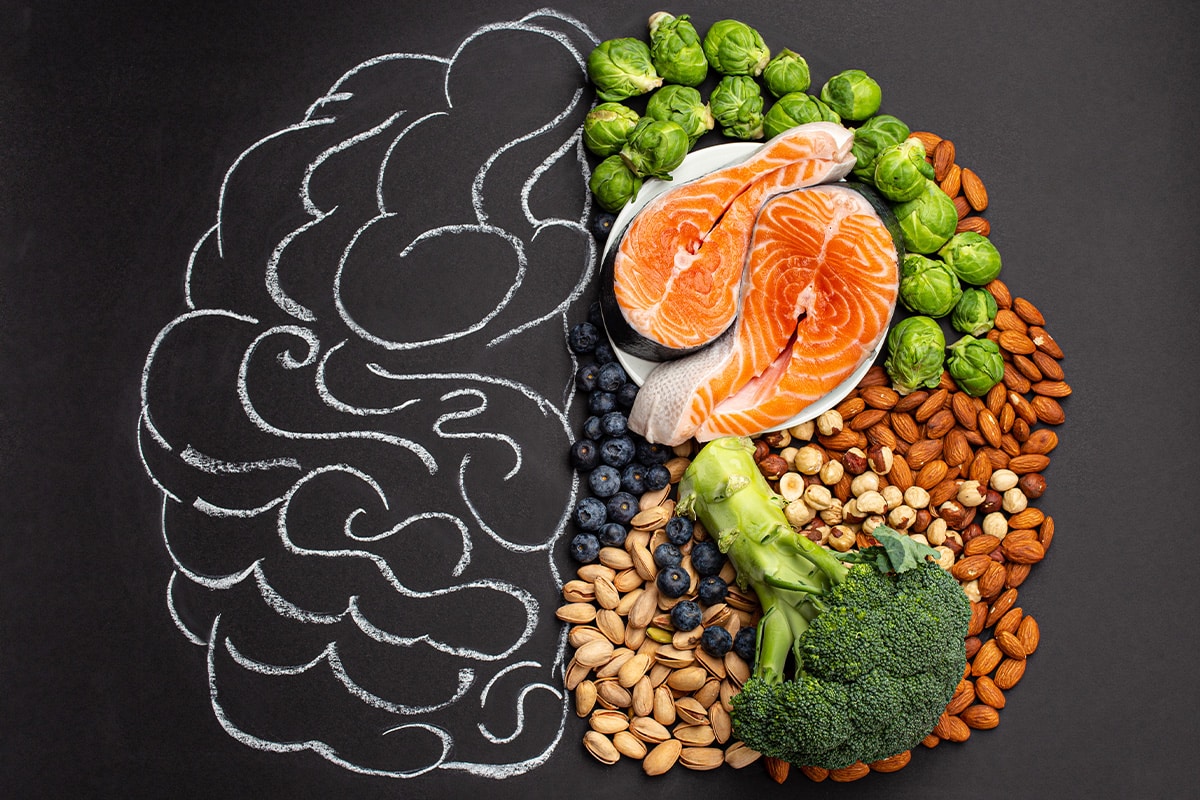By Jessica Stone, RD, LD — Registered Dietitian
Why Nutrition Matters for Mental Health & Recovery
The food on your plate can be as crucial to your mood as any medication. Because nutrition and mental health are deeply connected, what you eat directly affects energy, focus, stress tolerance, and emotional balance.
At Enterhealth, this connection is a cornerstone of functional psychiatry, our whole-person approach to care.
Instead of managing symptoms in isolation, we look at how diet, gut health, sleep, hormones, and nutrient balance shape brain chemistry and behavior. In functional medicine, a nutrition focus examines how nutrients affect the brain and body to correct imbalances at their root, while a dietary focus translates that science into practical, sustainable habits tailored to each person. Together, these perspectives turn nutritional insight into personalized, effective care.
Substance use disorders are also closely tied to malnutrition. Addiction and eating behaviors share overlapping brain circuits that govern reward, stress, and motivation, and research shows certain high-fat binge patterns can temporarily ease opioid withdrawal while reinforcing alcohol-related cravings¹. Simply put: what you eat affects how you feel—and how well you recover.
A nutrient-dense, balanced way of eating supports healthy neurotransmitter activity, steady blood sugar, reduced inflammation, and more resilient stress responses. That combination can translate to clearer thinking, a stable mood, and stronger long-term recovery.
Nutrition for Mental Health: Foods That Fuel Your Brain & Boost Mood
Your brain runs on nutrients. Here’s how key categories support emotional stability and recovery:
- Macronutrients (carbs, fats & protein). They fuel your brain, stabilize energy, and help regulate emotions. Aim for balanced plates with whole grains or starchy vegetables, high-quality proteins (eggs, Greek yogurt, fish, poultry, legumes), and healthy fats (olive oil, nuts, seeds, avocado)².
- Micronutrients (vitamins & minerals). B-vitamins, folate, vitamin D, magnesium, and zinc are essential for cognition and mood regulation—find them in leafy greens, beans, nuts, seeds, eggs, seafood, and (for vitamin D) safe sun exposure¹.
- Omega-3 fatty acids. Abundant in salmon, sardines, trout, walnuts, and flax, omega-3s help reduce inflammation and are associated with improvements in depression and anxiety.
- Gut health. The gut-brain axis influences mood, motivation, and stress reactivity. Support it with fiber-rich foods (vegetables, fruits, legumes, whole grains) and fermented options like yogurt, kefir, sauerkraut, or kimchi.
- Limit added sugar & ultra-processed foods. These can drive blood-sugar spikes, inflammation, and sleep disruption—factors that can worsen mood and cravings.
How Diet Supports Mental Health During Recovery
Functional nutrition goes beyond calories—it’s about restoring balance across the brain and body. The quality of a patient’s overall diet is a strong predictor of mental health outcomes. Diets emphasizing whole foods are linked to lower rates of depression and better cognitive performance, while highly processed patterns correlate with higher risk³.
Two well-studied patterns often used as frameworks (not one-size-fits-all prescriptions) in recovery and mental health care:
- Anti-inflammatory & antioxidant. Rich in omega-3s, polyphenols, and fiber, the MedDiet is associated with lower inflammation, which has been shown to contribute to depression and cognitive decline¹,³.
- Mood & cognition. Better adherence correlates with fewer depressive symptoms and improved emotional well-being.
- Stable blood sugar. High-fiber whole foods minimize glucose crashes that can worsen irritability, fatigue, and cravings.
- Recovery support. By improving metabolic and neurological health, the MedDiet can reduce vulnerability to stress-triggered relapse patterns.
- Neuroprotective effects. Emerging evidence suggests ketogenic patterns can stabilize brain metabolism and reduce neuroinflammation, with potential benefits in severe depression, anxiety, bipolar disorder, and schizophrenia⁴⁻⁶.
- Neurotransmitter balance. Ketogenic states may modulate GABA, dopamine, and serotonin—key systems for stress, mood, and cravings.
- Metabolic support. Keto can address insulin resistance, a common issue in people with psychiatric conditions or early recovery.
Note: Keto is not for everyone. At Enterhealth, any structured diet is considered only when clinically appropriate and is closely monitored for safety, tolerability, and sustainability.
Everyday Nutrition Tips for Mental Health
Changing how you eat doesn’t have to be overwhelming. Small, consistent steps can drive measurable improvements in mood and energy.
- Start small. Add one vegetable to lunch or dinner, swap one sugary drink for sparkling water, or choose whole-grain bread.
- Plan ahead. Batch-prep balanced meals, such as grain bowls, sheet-pan dinners, soups, or smoothie kits, so healthy choices are easy.
- Build balanced plates. Fill half your plate with vegetables, a quarter with lean protein, and a quarter with whole-grain or starchy veg; add healthy fat.
- Support your microbiome. Aim for 25–35g of fiber daily from diverse plant foods; include fermented foods a few times per week.
- Limit ultra-processed snacks. Keep nuts, fruit, yogurt, hummus & veggies handy for quick, steady energy.
- Supplement wisely. Before starting vitamin D, magnesium, or omega-3s, talk with your provider about labs and dosing to target your needs.
Functional Psychiatry & Nutrition: The Enterhealth Approach
At Enterhealth, nutrition isn’t a lifestyle trend—it’s a clinical intervention. Our team integrates nutritional science within a functional psychiatry framework to uncover and address drivers of distress such as inflammation, micronutrient deficiencies, impaired methylation, blood-sugar instability, and microbiome imbalance.
- Assessment. We review diet patterns, medical history, medications, labs, and lifestyle factors that influence mood and recovery.
- Personalized plan. We match nutrition strategies to your biology and goals—often drawing from Mediterranean-style patterns and other evidence-based protocols.
- Coordination with care. Nutrition is aligned with psychotherapy, medical management, sleep optimization, and movement to reinforce progress on every front.
- Because true recovery doesn’t happen in isolation—it happens when body & mind heal together.
If you or someone you love is ready to take the next step toward recovery, our team can help. At Enterhealth, every treatment plan begins with a comprehensive assessment designed to uncover the underlying factors—nutritional, biological, and psychological—that influence health and healing.
Contact us today to learn how personalized, science-based care can restore balance, strengthen resilience, and support lasting recovery.
SOURCES:
- García-Estrada, J., et al. (2025). Malnutrition in Substance Use Disorders. Healthcare (Basel), 13(8), 868.
- Sarris, J., et al. (2015). Nutritional medicine as mainstream in psychiatry. The Lancet Psychiatry, 2(3), 271–274.
- Eliby, D., et al. (2023). Diet quality and anxiety/depression: A review. Journal of Affective Disorders Reports, 14, 100629. https://doi.org/10.1016/j.jadr.2023.100629
- Ricci, A., et al. (2020). Exploring mechanisms of the antidepressant effect of the ketogenic diet. Reviews in the Neurosciences, 31(6), 695–707.
- Włodarczyk, A., et al. (2021). Ketogenic diet for depression—Hype or hope? Progress in Neuro-Psychopharmacology & Biological Psychiatry, 109, 110229.
- Attaye, I., et al. (2021). Effects of ketogenic diets on the gut microbiota. Nutrients, 14(1), 191.




